Imran Khan's trajectory from cricket star to Prime Minister of Pakistan showcases his significant influence. He led the national cricket team to victory in the 1992 World Cup, becoming a national hero. In 1996, he established the Pakistan Tehreek-e-Insaf (PTI) party to tackle corruption and promote reforms. His political journey culminated in his election as Prime Minister in 2018, though he faced a tumultuous end with his ousting in 2022. Khan's legacy continues to inspire youth engagement in politics and social change in Pakistan. To understand the full scope of his impact, there's much more to explore.
Key Takeaways
- Imran Khan, born in 1952, gained fame as a cricket star, leading Pakistan to its first World Cup victory in 1992.
- He founded the Pakistan Tehreek-e-Insaf (PTI) party in 1996 to combat corruption and promote social reforms.
- Khan became the 22nd Prime Minister of Pakistan in August 2018 after PTI emerged as the largest party.
- He was ousted in April 2022 through a no-confidence vote, highlighting the challenges of his governance.
- Khan's journey inspires youth engagement in politics, promoting initiatives like the Ehsaas Programme for education and welfare.
Introduction
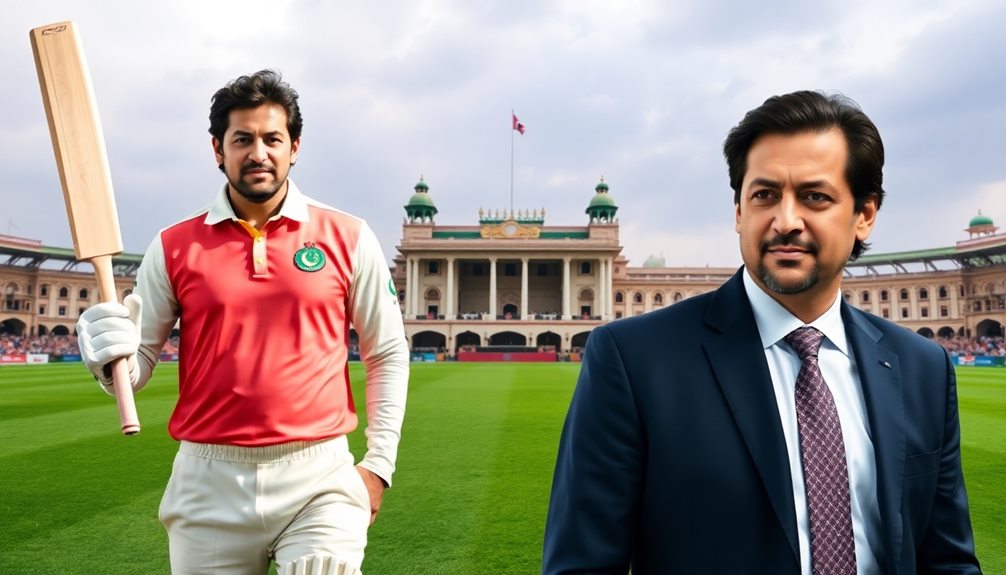
Imran Khan's journey from cricket legend to Prime Minister of Pakistan is a remarkable tale of ambition and resilience. He first captured the world's attention as a cricket star, leading the national team to its historic Cricket World Cup victory in 1992. This triumph established him as a national hero, but Khan didn't stop there.
After hanging up his cricket bat, he founded the Pakistan Tehreek-e-Insaf (PTI) party in 1996, driven by a mission to combat corruption and implement social reforms.
In August 2018, Khan's political career reached a pinnacle when he was elected the 22nd Prime Minister of Pakistan, following PTI's emergence as the largest party in the National Assembly elections. His tenure was marked by significant economic challenges; he negotiated a crucial $6 billion bailout from the IMF to tackle a dire balance of payments crisis.
However, Khan's time in office faced mounting opposition, culminating in April 2022 when he became the first Pakistani prime minister to be ousted through a no-confidence vote. His journey reflects not just personal ambition but also the complexities of governance in Pakistan.
Background
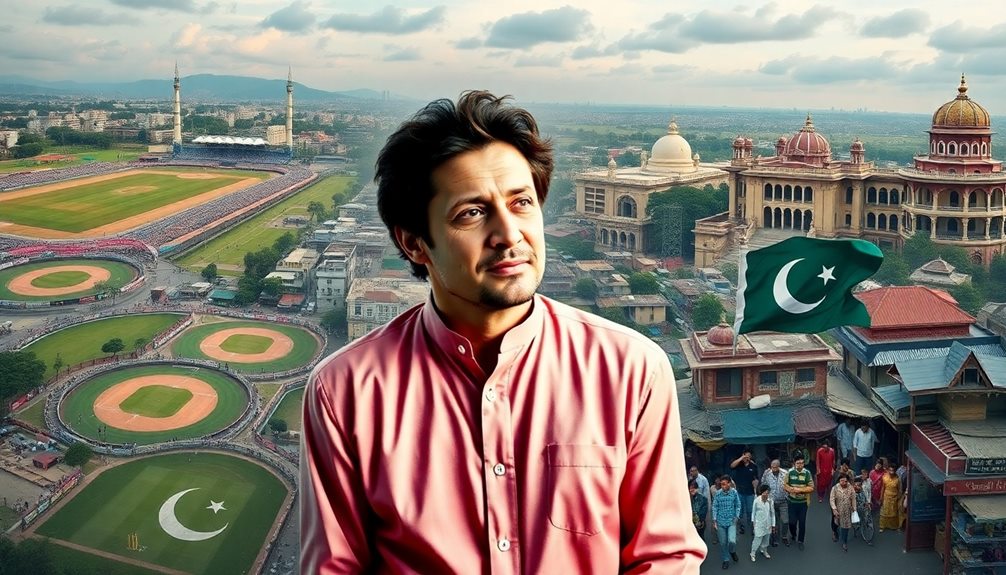
Born into an affluent Pashtun family in Lahore, Pakistan, on October 5, 1952, Khan enjoyed a privileged upbringing as the only son among four sisters. He received his education at prestigious institutions, including the Royal Grammar School in Worcester and Keble College, Oxford, where he earned a degree in Philosophy, Politics, and Economics in 1975.
Imran Khan rose to international fame as a cricket star, making his debut for the Pakistan national team in 1971. His leadership culminated in the team's historic World Cup win in 1992, solidifying his status as a national hero.
Following his retirement from cricket, he sought to make a difference in Pakistan by founding the Pakistan Tehreek-e-Insaf (PTI) party in 1996, focusing on social reforms and tackling corruption charges that plagued the country.
Before venturing into politics, Khan was often characterized by a playboy image, marked by his high-profile relationships, including his marriage to British heiress Jemima Goldsmith in 1995.
This diverse background laid the foundation for his later ascent to becoming prime minister, as he transitioned from sports icon to political leader.
Cricket World Cup Victory
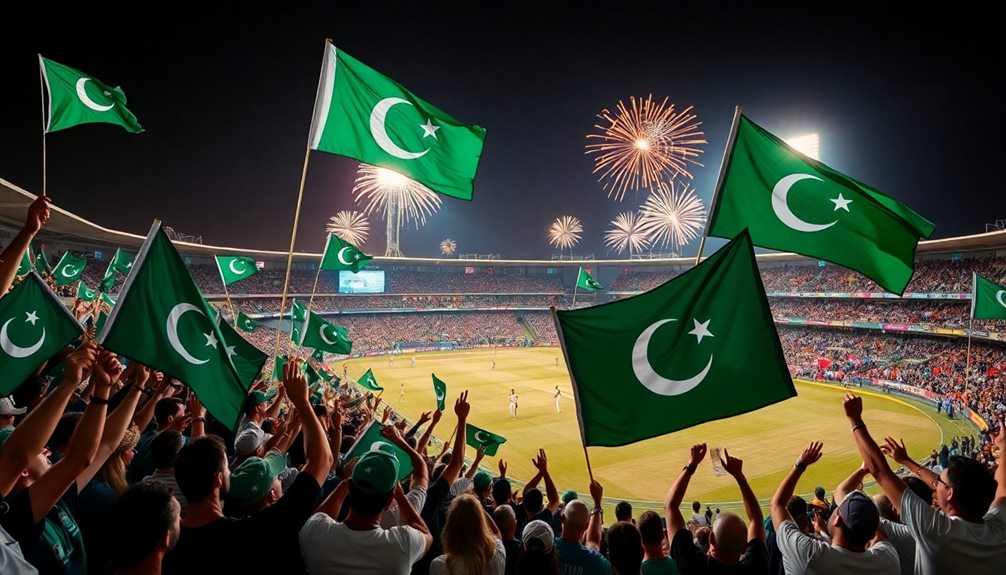
In 1992, the Pakistan national cricket team achieved a historic milestone by winning its first and only Cricket World Cup, a triumph that would forever be etched in the nation's memory. Under Imran Khan's leadership, Pakistan faced England in the final match at the Melbourne Cricket Ground on March 25, 1992. The national team secured a remarkable victory by 22 runs, marking a defining moment in sports history.
Khan played a pivotal role in this triumph, scoring 72 runs and taking a crucial wicket. His performance not only helped clinch the title but also solidified his status as a cricketing legend. The victory resonated deeply within Pakistan, uniting the country in a wave of pride and joy. It became a moment that transcended sports, capturing the hearts of millions and fostering a sense of national identity.
Khan's success in the Cricket World Cup propelled his celebrity status, allowing him to transition into a prominent political figure and philanthropist. This historic win remains a testament to his leadership and the enduring spirit of the Pakistan national team, symbolizing hope and resilience for generations to come.
Nationwide Celebrations and Protests
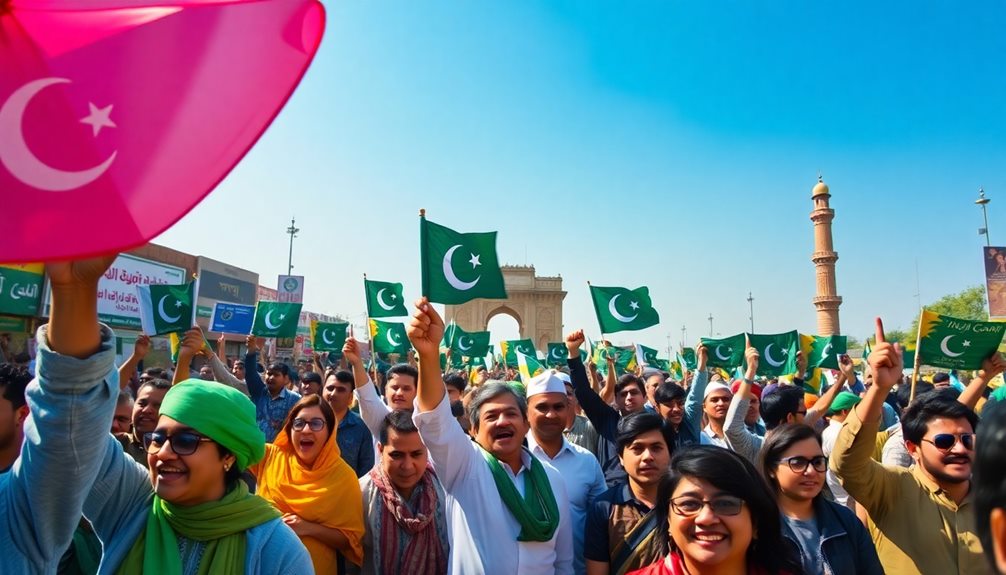
The political landscape in Pakistan has been marked by fervent celebrations and intense protests, reflecting the complex legacy of Imran Khan. Following his ousting in April 2022 via a no-confidence vote, massive protests erupted nationwide as supporters of Pakistan Tehreek-e-Insaf demanded his reinstatement. These protests highlighted public frustration with the political establishment and showcased Khan's lasting influence.
In August 2023, after Khan faced conviction on corruption charges, protests intensified, revealing a deep-seated sentiment of perceived political victimization among his backers. Despite ongoing legal challenges, Khan's popularity remained steadfast, as evidenced by the large crowds that gathered at his political rallies. These public gatherings serve as a testament to his status as a national hero, intertwining his cricket legacy with his political journey.
Nationwide celebrations erupted in 1992 when Khan led the cricket team to its first and only World Cup victory, solidifying his cultural icon status. Significant anniversaries related to both his cricket achievements and political milestones continue to draw public attention, demonstrating the enduring impact of Imran Khan on Pakistan's social and political fabric.
Inspiration for Youth Leadership
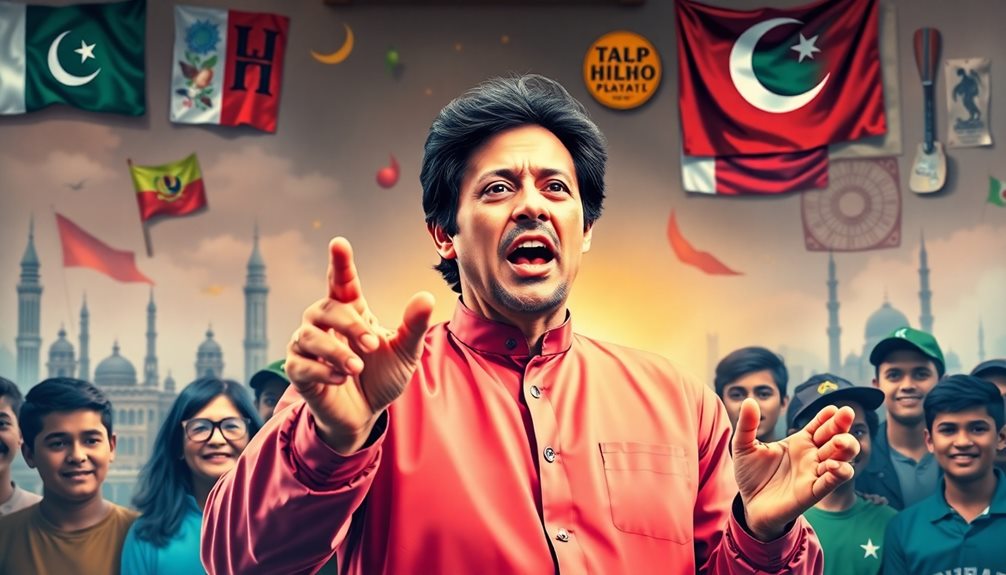
Imran Khan's journey from cricket legend to political leader serves as a powerful inspiration for youth leadership in Pakistan. By founding Pakistan Tehreek-e-Insaf (PTI) in 1996, Khan ignited a spark of youth engagement, encouraging young people to actively participate in politics and advocate for social reform.
His transition from a celebrated cricketer, who led Pakistan to its first World Cup victory in 1992, to a prominent political figure illustrates the importance of perseverance and resilience in pursuing leadership roles.
Khan's initiatives, such as the Ehsaas Programme and Namal College, emphasize education and welfare, urging the youth to focus on community service and social responsibility. These efforts have inspired a new generation to take charge and contribute to their communities.
During his political campaigns, Khan successfully mobilized mass support, particularly from younger demographics, showcasing the immense potential of youth engagement in shaping the nation's future.
As a symbol of excellence and determination, Imran Khan motivates aspiring leaders in Pakistan to strive for change, emphasizing that with dedication and commitment, they can make a significant impact in their society.
Frequently Asked Questions
How Did Imran Khan Start His Career?
He started his career in international cricket in 1971, making his debut against England.
Quickly, he showcased his skills as a talented all-rounder, earning recognition in the sport.
By 1982, he began captaining the national team intermittently, ultimately leading them to a historic victory in the 1992 Cricket World Cup.
Following this triumph, he retired from cricket, transitioning into philanthropy and later politics, where he aimed to effect change in society.
Why Did Imran Khan Leave Prime Minister?
The former Prime Minister faced removal due to a no-confidence vote, marking a historic moment in the country's politics.
Public dissatisfaction over soaring inflation and economic mismanagement eroded his initial popularity. Opposition parties united against him, capitalizing on this unrest and accusing him of failing to fulfill governance and reform promises.
Additionally, his loss of military support, crucial for political stability, significantly contributed to his ousting and subsequent legal challenges.
How Good Was Imran Khan as a Cricketer?
As a cricketer, he showcased exceptional skill and leadership. He debuted in 1971, playing 88 Test matches and scoring 3,807 runs, including six centuries.
He led his team to victory in the 1992 Cricket World Cup, cementing his legendary status. With 362 Test wickets, he became the first Pakistani to achieve this milestone.
His remarkable achievements earned him a spot in the ICC Cricket Hall of Fame, reflecting his greatness in the sport.
Who Is the Best Leader of Pakistan?
Determining the best leader of Pakistan often sparks passionate debates. Many admire leaders for their vision, policies, and impact on the nation.
Some argue that figures like Muhammad Ali Jinnah laid the foundation for Pakistan's creation, while others point to more recent leaders who championed economic reforms or social welfare. These debates often highlight the evolving priorities and challenges faced by the nation at different points in its history. While Jinnah’s vision set the ideological groundwork, the efforts of contemporary leaders to transform urban hubs parallel the modernization seen in places like Gurgaon modern business center, illustrating a push for progress and global integration. Such developments underscore the interplay between historical aspirations and present-day ambitions in shaping Pakistan’s future trajectory.
Ultimately, the assessment may vary based on individual perspectives, as each leader's contributions reflect different eras and challenges faced by the country.










